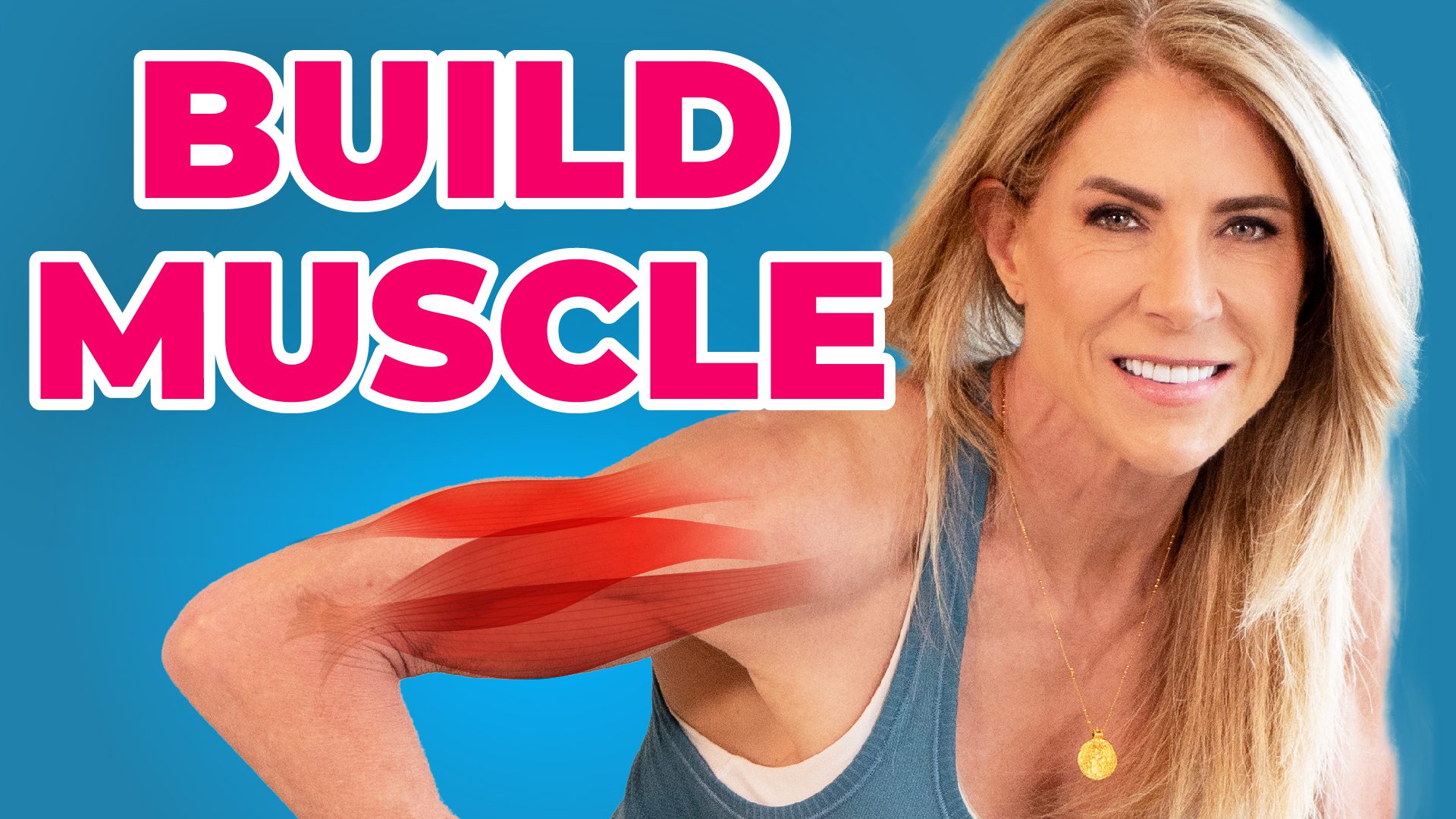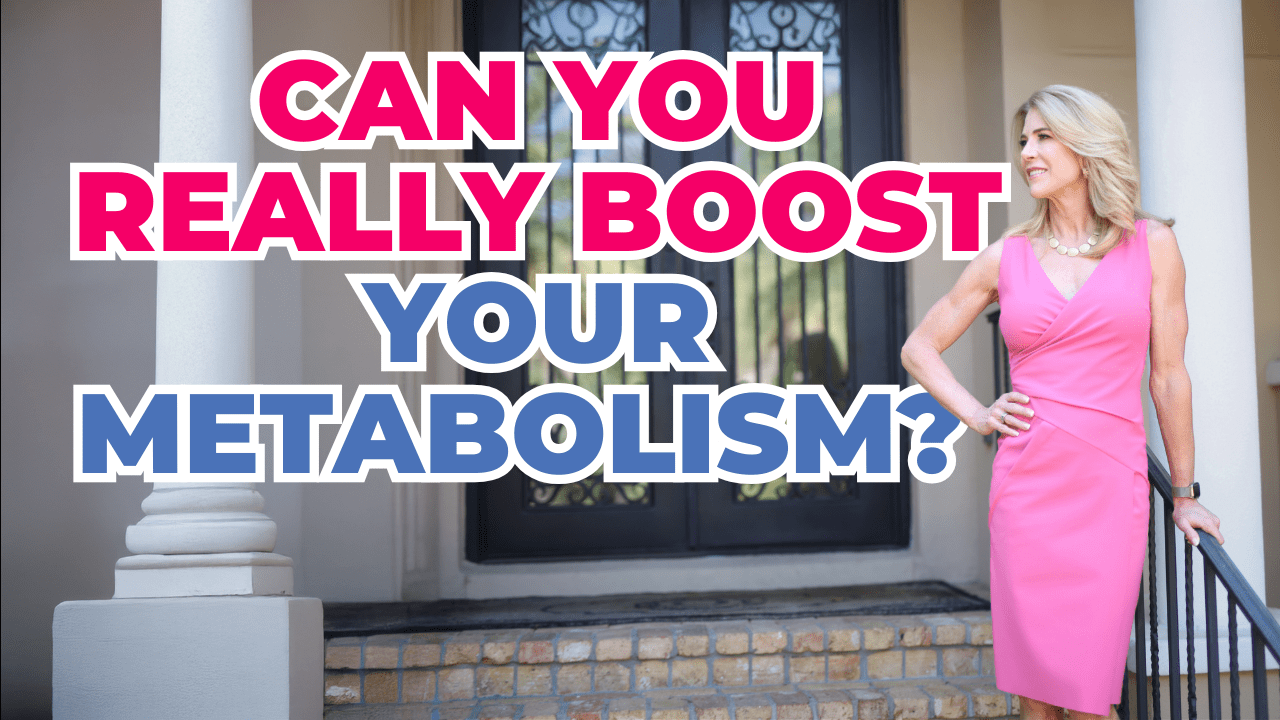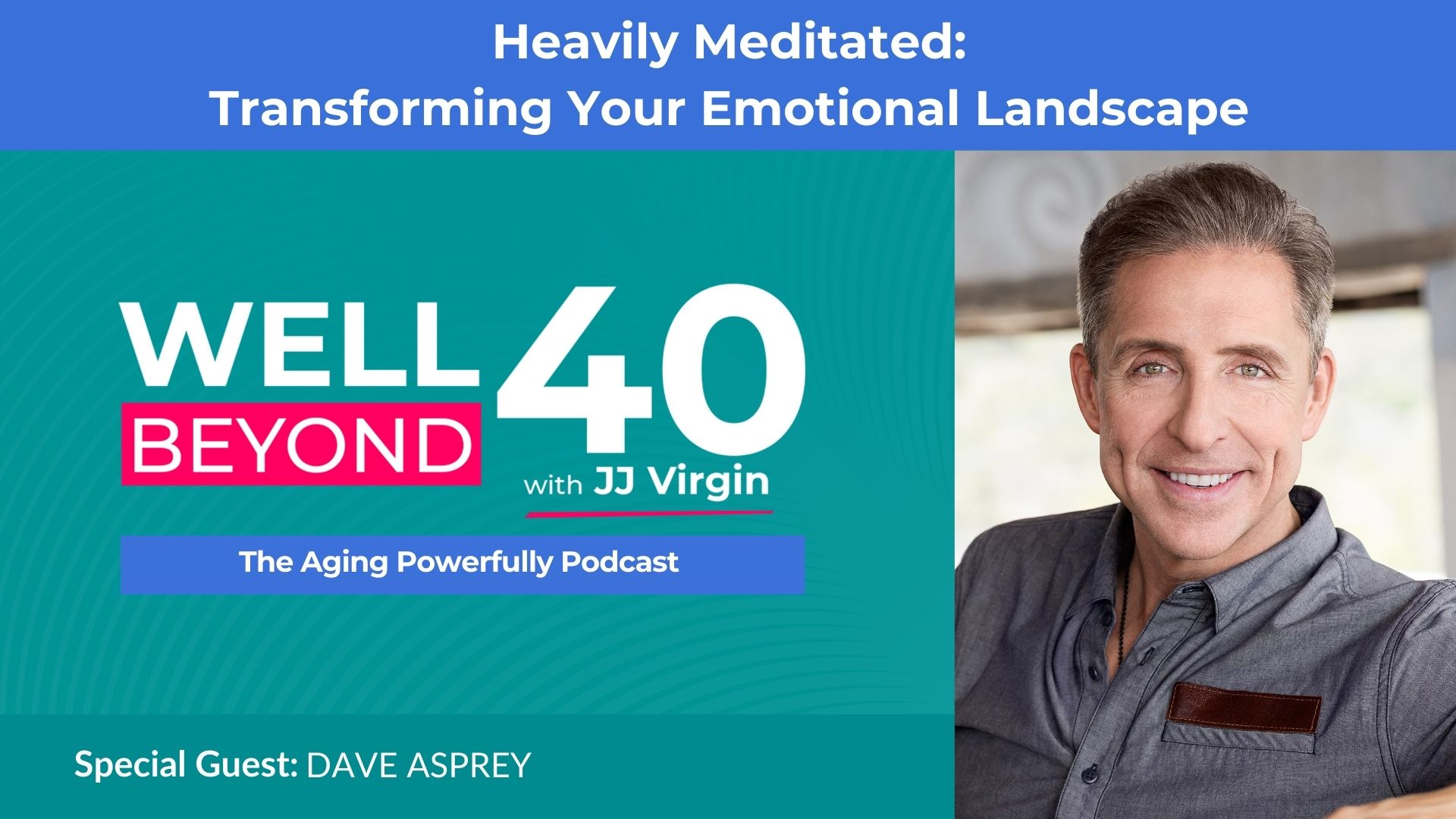Proven Strategies and Cutting-Edge Research for Accelerating Muscle Gains
In this episode, we’re diving deep into the science of building muscle and speeding up those gains! If you’re tired of feeling like progress is at a snail’s pace, I’ve got three proven strategies that will help you see results faster.
First up, we’re talking nutrition and the critical role of protein in muscle synthesis. Discover how optimal protein intake, especially the right amount of leucine, can trigger muscle growth. Plus, I’ve got a free 7-day protein challenge waiting for you at jjvirgin.com/7day to kickstart your journey.
Next, we’ll explore the power of pre-workout carbs and their surprising benefits. A 2016 study revealed that carbs before exercise can boost performance, reduce fatigue, and even enhance brain function during workouts. I’ll share my personal experiments with fasted versus non-fasted workouts and why timing your carbs and protein around your exercise sessions is crucial for maximizing muscle gains.
Supplements can make a significant difference, and I’ll highlight the heavy hitters like creatine, vitamin D, and fish oil. Learn which supplemennt can supercharge your energy during high-intensity workouts, why vitamin D is essential for muscle function, and the muscle-building benefits of omega-3s from fish oil. Plus, I’ll introduce you to a supplement that enhances mitochondrial health for better endurance and recovery.
Finally, we’ll touch on the importance of hormones like thyroid and estrogen in muscle building. Balancing these hormones can significantly impact your strength and muscle growth. I’ll also share practical tips for incorporating recovery techniques such as sauna sessions, red light therapy, and massages into your routine to optimize muscle repair and growth.
Don’t miss out on these game-changing tips!
Timestamps
00:01:16 – How Protein Plays into Building Muscle
00:01:46 – The Science Behind Carbs as Pre-Workout Fuel
00:02:05 – Breaking Down Fasted vs Unfasted Workouts
00:02:17 – The Role of Nutrition in Muscle Growth
00:03:03 – Supplements for Enhanced Muscle Building
00:06:55 – Hormones and Muscle Health
00:11:17 – Effective Workout Strategies
00:11:52 – Recovery Techniques for Optimal Muscle Growth
00:15:14 – Setting Realistic Expectations and Conclusion
Resources Mentioned in this episode
Use my Eat Protein First Calculator
Vital Choice wild-caught seafood
Kooru Cold Plunge and use code JJVIP500 for $500 off.
Timeline Mitopure (Urolithin A)
Sunlighten Sauna use promo code JJVIRGIN when requesting pricing information for $600 off.
Download my FREE Best Rest Sleep Cheat Sheet
Therasage saunas & red light therapy use code VIRGIN20 for 20% off
Study: Effect of Carbohydrate Intake on Maximal Power Output and Cognitive Performances
Study: Role of thyroid hormone in skeletal muscle physiology
Study: The Influence of Estrogen on Skeletal Muscle
Study: Impact of Cortisol on Reduction in Muscle Strength and Mass: A Mendelian Randomization Study.
Episode Sponsors:
Try Timeline. Use code JJ10 for 10% off all products
Try Qualia risk free for up to 100 days and code VIRGINWELLNESS for an additional 15% off
I’m JJ Virgin, PhD dropout, sorry mom, turned four time New York Times bestselling author. Yes, I’m a certified nutrition specialist, fitness hall of famer, and I speak at health conferences and trainings around the globe, but I’m driven by my insatiable curiosity and love of science to keep asking questions, digging for answers, and sharing the information I uncover with as many people as I can.
And that’s why I created the Well Beyond 40 Podcast. To synthesize and simplify the science of health into actionable strategies to help you thrive. In each episode, we’ll talk about what’s working in the world of wellness, from personalized nutrition and healing your metabolism, to healthy aging and prescriptive fitness.
Join me on the journey to better health so you can love how you look and feel right now and have the energy to play full out at 100.
Building muscle. Can feel like watching grass grow, but there’s some science back ways to make it happen faster. And the more you focus on the three major strategies I’m going to share in this video, the better your results. First up, you gotta feed your muscles. I think about protein and carbs. Well, first of all, protein’s key because protein helps drive muscle protein synthesis.
Lehman that you need somewhere between 2. 5 to 4 grams of leucine to trigger mTOR to trigger muscle protein synthesis. So you want to eat optimal amounts of protein for you and I created a protein calculator and a free 7 day protein challenge that you can get at jjvirgin. com forward slash 7 day the number 7.
There was a 2016 randomized test. Clinical trial in the journal Sports that found that having carbs before a workout helped athletes perform better. They perform better in short intense activities and also they felt less tired and their brains worked better which allowed them to react quicker and pay better attention during the exercises.
I did a couple months where I was really testing out fasted versus non fasted workouts because there was so much buzz about fasted workouts and I kept thinking, I don’t know that this makes so much sense because really when you’re doing intense workouts and if we’re doing workouts to build muscle.
We’re doing intense workouts, right? If you’re doing intense workouts, you’re really going to use more glucose and glycogen than you are fat anyway. So the whole point of fast workouts was you’d burn more fat, but I’m like, but I’m doing intense workouts and not really looking at burning fat. And if you really want to burn fat, it really comes down to.
Overall energy flux throughout the day. And you really want to think about eating around your workouts like an hour or two before and then after so that you’re supplying your body what it needs in terms of carbs and protein to refuel your glycogen stores, the energy stores of carbs in your muscles. So you can use those to work out harder and that you’ve got the protein that you need to fuel muscle protein synthesis and refuel those amino acid stores.
What about supplements? Because supplements can make a big difference. Big, big difference. And the first one I have to shout out, of course, is creatine. So creatine is going to boost muscle energy production during high intensity exercise. Creatine basically is part of phosphocreatine, which is what we use when those short, intense bursts of exercise.
There was a 2017 literature review that was published in Current Protein and Peptide Science that showed that taking creatine supplements can help you build more muscle and get stronger because creatine increases the creatine and phosphocreatine in your muscles. Which then helps regenerate energy during those intense workouts, which means that you can perform better during strength training, which leads to more muscle growth and strength over time.
Another one you might not have thought about in terms of building muscle is vitamin D, but vitamin D is important because it helps with muscle protein synthesis, which is essential, of course, for building or impairing muscle tissue. It supports muscle function and strength by aiding in calcium absorption, which of course is critical for muscle growth.
Muscle contraction, and then I always take vitamin D3 with K2 and K2 plays a role in bone health, indirectly impacting muscle function and strength. Now, together, these contribute to overall muscle health by helping maintain muscle mass and function and supporting recovery after surgery. There was a 2017 non randomized controlled trial that was published in BioGerontology that looked at the effects of Nordic walking training combined with vitamin D supplementation on inflammation in elderly women.
And what they did was they divided participants into two groups based on their baseline vitamin D levels. And the results showed a significant decrease in two pro inflammatory proteins in the group with higher baseline vitamin D levels after the 12 week intervention. There was a rise in another protein called myokineuresin that was induced by exercise that indicated a potential anti inflammatory effect.
So what this study suggests is that by combining training in vitamin D supplementation, You reduce inflammation in older women with better outcomes observed in those who had higher baseline vitamin D levels. Now, fish oil. Fish oil is interesting because it also can be anabolic. First of all, we know that fish oil as an omega 3 can reduce inflammation, so it can reduce muscle soreness and inflammation potentially after workouts.
But also, omega 3 fatty acids, those are what are in fish oil, may enhance muscle protein synthesis, so could be anabolic. Fish oil supplements may improve muscle strength and function, especially in older adults and enhance exercise performance by improving blood flow and oxygen delivery to muscles. Fish oil can also help prevent muscle loss during periods of inactivity or aging.
So there was a study in 2013, it was a non randomized control trial published in the journal Nutrition that found that fish oil helps prevent. Build muscle by improving the balance between muscle protein and DNA and increasing muscle protein mass. Fish oil activates important signaling pathways like AKT and FOXO, which are essential for muscle growth and maintenance.
And it suppresses pro inflammatory cytokines, which can lead to muscle atrophy. So it helps preserve muscle mass. Another supplement that I love is MitoPure. MitoPure from Timeline Nutrition. It’s Eurylithin A and it can increase mitochondrial biogenesis, which means you’re building new mitochondria in the cell.
And improved mitochondrial function means better energy production within the muscle cells, which could lead to increased endurance and performance during workouts. Plus, MitoPure may reduce muscle damage and oxidative stress and allow you to recover more quickly between exercise sessions. MitoPure also may support muscle growth and strength over time because it’s promoting that mitochondrial health.
And it’s ability to enhance cellular metabolism could optimize nutrient uptake and utilization by muscle cells, which aids also in muscle building effects. Next up, let’s make sure your hormones are helping you, not hurting you. Now you probably think hormones using testosterone, but no. You got to make sure that your thyroid is working optimally because thyroid hormones, like we’re talking T3, T4 are important for controlling how your body uses energy, including building and breaking down muscle proteins.
Having your thyroid just right is key to keeping your muscles strong and healthy. These hormones have a big say in how your body builds energy. It’s a website that burns energy and uses nutrients, which directly affects how your muscles grow and mend. Bottom line is when your thyroid isn’t doing its job properly, like if you’ve got hypothyroidism, you might feel weak, tired, and have trouble making new muscle.
So keeping your thyroid hormones in check is critical for making the most of your muscle building efforts. There was a study in 2018, it was an epidemiological analysis and it was published in the Journal of Endocrinology and it showed that thyroid hormones are important for growing, staying warm. And keeping your metabolism working right.
They also play a big role in how our muscles move, grow, and get energy. To make all this happen, thyroid hormone needs to get around our body, which it does with the help of certain proteins and receptors in our cells. These proteins and receptors help us Thyroid hormone do its job. When your body needs thyroid hormone, it gets converted from one form, T4, to another, T3, with the help of certain enzymes.
T3 is like the boss when it comes to muscle movement and energy. It controls how your muscles relax and contract, and helps them get energy from your food. The levels of thyroid hormone inside our cells are controlled by how much is converted into T3 and how much is turned into reverse T3, which is another less active form.
The balance of thyroid hormones inside our cells affects how our muscles repair themselves and grow new muscle cells. So having good thyroid function is a must for building muscle. Now, estrogen is another key player in keeping muscles strong and healthy. And by the way, I’m talking to women here on this one.
Imagine your muscles as a house with estrogen as the builder laying down the bricks. Without enough estrogen, your muscles might not be as sturdy or resilient. Estrogen matters. Even more for women when building muscle, it helps regulate the balance between building new muscle, that protein synthesis, and breaking down old muscle.
Having the right amount of estrogen is essential for women to achieve their muscle building goals and maintain overall strength and fitness. There was a systematic review that was published in 2023 in the journal and in this journal, the researchers looked at the role of Estrogen and female skeletal muscle aging and the study aimed to explore how estrogen deficiency, such as in postmenopausal women, or estrogen supplementation, such as through estrogen therapy, affects skeletal muscle mass function, damage, repair, and energy metabolism, and the review includes this.
32 studies suggest that estrogen deficiency in postmenopausal women is associated with reduced muscle mass and strength. Estrogen appears to reduce markers of muscle damage, inflammation, and animals and promote muscle repair and regeneration. It also may protect muscles by working as an antioxidant to reduce oxidative damage, stabilize cell membranes by fitting between their fat layers, and attaching to estrogen receptors controlling the activity of various genes and targets.
The other thing that’s important is cortisol. Now cortisol is your primary stress hormone and it can really mess with your muscle building goals. It can disrupt the delicate balance needed for muscle growth when you’re totally stressed out. But cortisol acts like a signal to your body, telling it to Tap into muscle tissue for energy when it’s stressed.
It’s like your body’s emergency fuel, but the downside is that it can lead to muscle breakdown instead of muscle growth. So if you’re constantly stressed, your body might end up breaking down more muscle than it can rebuild. And that’s a problem if you’re aiming to get stronger or gain muscle mass.
There was a study in 2021, it was a meta analysis published in the Journal of Body Mass. Clinical endocrinology and metabolism looked at how cortisol levels affect muscle strength and mass. The researchers found higher cortisol levels were linked to weaker grip strength and linked to lower overall muscle mass, especially in women.
Now, when they adjusted for fasting glucose, that whole thing was weakened suggesting that glucose here might also be important, but the research provides insight into how to cortisol could influence the development. Remember, sarcopenia is low muscle mass. You also have to do the work. And in order to build muscle, you need volume.
So you want to do six to 30 repetitions per set. You want to do multiple sets with about a 90 second to two minute rest break each In between when you’re doing this, you want to also continue to progress. Here’s the thing with exercise. It should never get easier. You’re getting stronger, but in order for something to be exercise, you have to do more than what you’re used to.
So how do you continue to progress? You can add an extra set. You can add more reps. You can change the tempo. You can add another exercise. Exercise. If you’ve got a very stable schedule, you can do eight weeks of a specific program where you’re continuing to progress within that program. And then take a week and it’s called a deload where you lighten your loads, you cut your intensity and volume, and it kind of gives you time to mentally recover.
It can reduce your risk of injury. So you can give yourself that little deload. I find when I travel, I kind of get some deloads in there, even though I didn’t want them. So, but if you’re at home and you find that you really can have a really great set schedule, that deloading can work really well. And again, it would be eight weeks of a very focused program where you’re continuing to increase and improve and then take a week of going a little bit easier and lighter and then go back and hit it again.
You got it. Really dial in your recovery because your recovery is really where you’re building the muscle. This is where you’re repairing. This is where you’re rebuilding. And sometimes this can be the hardest thing for us to do. Really critical here as you do more intensity, make sure you’re getting good sleep.
Sleep is where we’re raising growth hormone, recovering and repairing. And another thing that can be really helpful here is sauna. There was a randomized controlled trial published in 2022 in biology of sport that found that a single post exercise infrared sauna session improved neuromuscular performance, reduced muscle soreness, enhanced perceived recovery without any detrimental effects on the autonomic nervous system.
It supported great mood and supported readiness for working out again. Another one that can work well is red light therapy. There was a 2015 study that looked at using red light therapy. Therapy to see how it helped the, uh, muscle cells. And it found that it actually improves mitochondrial respiration, which is great for energy production and great for enhancing exercise performance.
The results were seen about three to six hours after the therapy. So go to the gym, come home if you have red light at home, great thing to do. Another thing that you can do that can help with recovery is cold plunging. However, there’s a caveat with this. Whereas sauna and red light can actually be done after a workout and help, cold plunge actually can get in the way of muscle protein synthesis.
When you work out, you’re going to create some inflammation. That’s actually a good thing. If you go and do cold plunging too soon, you can actually get in the way of that process. And while it might reduce inflammation, it might also reduce muscle protein synthesis. So with cold plunging, what I actually do is I will do cold plunging or cold shower in the morning before I go to work out.
This is another one you can do to help recover. Massage. A great massage can help as well. There was another study that was published in the Journal of Physiology found that compressive loading massage can help muscles recover, grow back and actually even change their structure if they’ve started to atrophy.
So it’s a very specific massage technique, but this massage technique can improve the size of the muscle fibers. and help muscles actually make protein. So the other one that I really love here besides this are, you know, Epsom salts bath. So I know not everyone has a sauna or red lights. Cold plunges, you can always get in a cold shower, so that works.
But the one that I do love is a great Epsom salts bath. And I will also use a foam roller and And so perhaps can’t get a massage. You can still use a foam roller or one of those home percussive units to achieve the same effect. Let’s talk realistic expectations. Those typical rate of muscle growth, one to two pounds a month with the strategies I just gave you.
Hopefully these will take you to the higher end of that and what you measure, monitor, you can improve.
Be sure to join me next time for more tools, tips, and techniques you can incorporate into everyday life to ensure you look and feel great and are. Built to last. Check me out on Instagram, Facebook, and my website jjvirgin. com and make sure to follow my podcast at subscribetojj. com so you don’t miss a single episode.
And hey, if you’re loving what you hear, don’t forget to leave a review. Your reviews make a big difference in helping me reach more incredible women just like you to spread the word about aging powerfully after 40. Thanks for tuning in. And I’ll catch you on the next episode.
Hey, JJ here. And just a reminder that the Well Beyond 40 podcast offers health, wellness, fitness, and nutritional information that’s designed for educational and entertainment purposes only. You should not rely on this information as a substitute for, nor does it replace professional medical advice, diagnosis, or treatment.
If you have any concerns or questions about your health, you should always consult with a physician or other healthcare professional. Make sure that you do not disregard, avoid, or delay obtaining medical or health related advice from your healthcare professional because of something you may have heard on the show or read in our show notes.
The use of any information provided on the show is solely at your own risk.
Hide Transcript

 Subscribe to our show
Subscribe to our show 




